

Question Eleven. Why does the human brain create false memories? From the BBC: Human memory constantly adapts and moulds itself to fit the world.

Now an art project hopes to highlight just how fallible our recollections are. All of us generate false memories and artist Alasdair Hopwood has been “collecting” them. For the past year he has asked the public to submit anecdotes of fake recollections which he turns into artistic representations. Question 10. What Is Regression? - Defense Mechanisms. Regression. Question Nine. Forgetting. By Saul McLeod published 2008 Why do we forget?
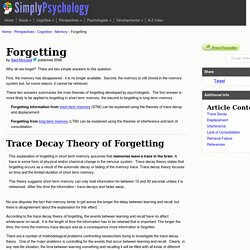
There are two simple answers to this question. First, the memory has disappeared - it is no longer available. Examples. Question Eight. Memory Retrieval - How Information is Retrieved From Memory. Examples. Question Seven. Stress Affects Learning and Memory. By Rick Nauert PhD Senior News Editor Reviewed by John M.
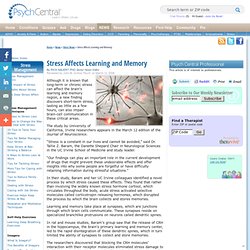
Grohol, Psy.D. on March 12, 2008 Although it is known that long-term or chronic stress can affect the brain’s learning and memory region, a new finding discovers short-term stress, lasting as little as a few hours, can also impair brain-cell communication in these critical areas. The study by University of California, Irvine researchers appears in the March 12 edition of the Journal of Neuroscience. “Stress is a constant in our lives and cannot be avoided,” said Dr. Tallie Z. “Our findings can play an important role in the current development of drugs that might prevent these undesirable effects and offer insights into why some people are forgetful or have difficulty retaining information during stressful situations.” In their study, Baram and her UC Irvine colleagues identified a novel process by which stress caused these effects.
Source: University of California – Irvine APA Reference Nauert, R. (2008). Question Six. Brain Control. How does long term memory work. Long-term memory (LTM) is a relatively permanent system that stores large amounts of information for long periods of time.
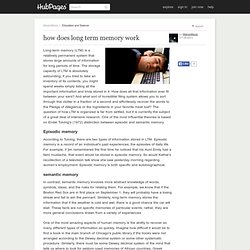
The storage capacity of LTM is absolutely astounding; if you tried to take an inventory of its contents, you might spend weeks simply listing all the important information and trivia stored in it. Question Five. Example. Psychology - Complete Guide to Psychology for Students, Educators & Enthusiasts. Question Four. Sensory memory. As of July 1, 2013 ThinkQuest has been discontinued.

We would like to thank everyone for being a part of the ThinkQuest global community: Students - For your limitless creativity and innovation, which inspires us all. Teachers - For your passion in guiding students on their quest. Partners - For your unwavering support and evangelism. Parents - For supporting the use of technology not only as an instrument of learning, but as a means of creating knowledge. We encourage everyone to continue to “Think, Create and Collaborate,” unleashing the power of technology to teach, share, and inspire. Best wishes, The Oracle Education Foundation. Sensory Memory Video. Iconic Memory: Definition, Examples & Quiz.
In this lesson you will learn about a specific type of memory called iconic memory.
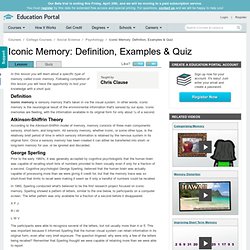
Following completion of this lesson you will have the opportunity to test your knowledge with a short quiz. Definition. Iconic Memory Picture. Echoic Memory: Definition, Lesson & Quiz. In this lesson you will learn about a specific sub-type of sensory memory referred to as echoic memory.
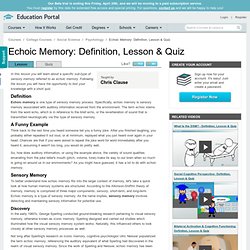
Following the lesson you will have the opportunity to test your knowledge with a short quiz. Definition. Echoic Memory Picture. Question Three. PSY 101 - Introduction to Psychology by Jeffry Ricker, Ph.D. Cognitive researchers study the mental processes that allow us to perform various tasks.
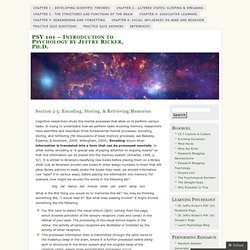
In trying to understand how we perform tasks involving memory, researchers have identified and described three fundamental mental processes: encoding, storing, and retrieving (for discussions of basic memory processes, see Baddely, Eysenck, & Anderson, 2009; Willingham, 2004). Encoding occurs when information is translated into a form that can be processed mentally. In other words, encoding is “a special way of paying attention to ongoing events” so that this information can be placed into the memory system (Schacter, 1996, p. 42).
It is similar to librarians classifying new books before placing them on a library shelf. Just as librarians encode new books in order assign numbers to them that will allow library patrons to easily locate the books they need, we encode information (we “label” it in various ways) before placing the information into memory. Dog car dance job mouse book can plant lamp sun. Question Two. Effortful Processing Video. Three Examples. Question One. How Our Brains Make Memories. Sitting at a sidewalk café in Montreal on a sunny morning, Karim Nader recalls the day eight years earlier when two planes slammed into the twin towers of the World Trade Center.
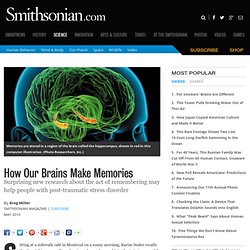
He lights a cigarette and waves his hands in the air to sketch the scene. At the time of the attack, Nader was a postdoctoral researcher at New York University. He flipped the radio on while getting ready to go to work and heard the banter of the morning disc jockeys turn panicky as they related the events unfolding in Lower Manhattan. Nader ran to the roof of his apartment building, where he had a view of the towers less than two miles away. He stood there, stunned, as they burned and fell, thinking to himself, “No way, man. In the following days, Nader recalls, he passed through subway stations where walls were covered with notes and photographs left by people searching desperately for missing loved ones. Memory Definition.